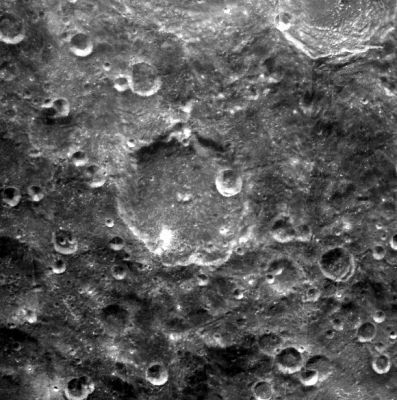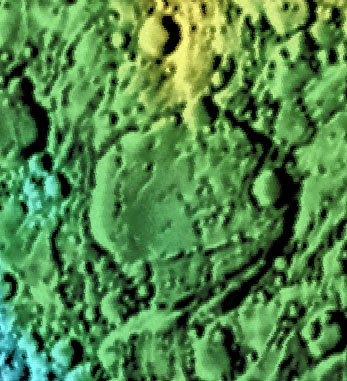Difference between revisions of "Buffon"
| Line 17: | Line 17: | ||
''([[LAC%20zone|LAC zone]] 122D1)'' [http://planetarynames.wr.usgs.gov/images/Lunar/lac_122.pdf USGS Digital Atlas PDF]<br /> <br /> | ''([[LAC%20zone|LAC zone]] 122D1)'' [http://planetarynames.wr.usgs.gov/images/Lunar/lac_122.pdf USGS Digital Atlas PDF]<br /> <br /> | ||
==Description== | ==Description== | ||
| − | While '''Buffon''' is some 200 kilometres away from the [[Apollo|Apollo Basin's]] south-eastern ring (~480 km, pre-Nec), the crater also lies on the north-eastern, outer ring of the [[South%20Pole-Aitken%20Basin|South Pole Aitken Basin]] -- a 2500 kilometre-wide basin of the [[Stratigraphy|pre-Nectarian]] period (~ 4.6 to 3.92 bn years). '''Buffon's''' outer rim -- particularly its north-eastern sector and especiallly its western sector -- is practically non-existant, but while most of its southern sector looks relatively sharp, impacts in the region here have remodeled its extension southwards, thus, increasing the crater's size. The inner rim regions have traceable elements of terracing all around, however, their well-worn appearance blends easily into a relatively level floor. A pair of peaks lie at the centre of the floor, but the rest is covered in hundreds of small impact craters -- one, particularly in the south-west, showing a higher albedo than the surrounding region.<span class="membersnap">- | + | While '''Buffon''' is some 200 kilometres away from the [[Apollo|Apollo Basin's]] south-eastern ring (~480 km, pre-Nec), the crater also lies on the north-eastern, outer ring of the [[South%20Pole-Aitken%20Basin|South Pole Aitken Basin]] -- a 2500 kilometre-wide basin of the [[Stratigraphy|pre-Nectarian]] period (~ 4.6 to 3.92 bn years). '''Buffon's''' outer rim -- particularly its north-eastern sector and especiallly its western sector -- is practically non-existant, but while most of its southern sector looks relatively sharp, impacts in the region here have remodeled its extension southwards, thus, increasing the crater's size. The inner rim regions have traceable elements of terracing all around, however, their well-worn appearance blends easily into a relatively level floor. A pair of peaks lie at the centre of the floor, but the rest is covered in hundreds of small impact craters -- one, particularly in the south-west, showing a higher albedo than the surrounding region.<span class="membersnap">- JohnMoore2</span><br /> <br /> |
==Description: Wikipedia== | ==Description: Wikipedia== | ||
[http://en.wikipedia.org/wiki/Buffon_(crater) Buffon]<br /> <br /> | [http://en.wikipedia.org/wiki/Buffon_(crater) Buffon]<br /> <br /> | ||
Latest revision as of 20:04, 16 April 2018
Contents
Buffon
|
Lat: 40.4°S, Long: 133.4°W, Diam: 106 km, Depth: km, Rükl: (farside), pre-Nectarian | |
Images
LPOD Photo Gallery Lunar Orbiter Images
Maps
(LAC zone 122D1) USGS Digital Atlas PDF
Description
While Buffon is some 200 kilometres away from the Apollo Basin's south-eastern ring (~480 km, pre-Nec), the crater also lies on the north-eastern, outer ring of the South Pole Aitken Basin -- a 2500 kilometre-wide basin of the pre-Nectarian period (~ 4.6 to 3.92 bn years). Buffon's outer rim -- particularly its north-eastern sector and especiallly its western sector -- is practically non-existant, but while most of its southern sector looks relatively sharp, impacts in the region here have remodeled its extension southwards, thus, increasing the crater's size. The inner rim regions have traceable elements of terracing all around, however, their well-worn appearance blends easily into a relatively level floor. A pair of peaks lie at the centre of the floor, but the rest is covered in hundreds of small impact craters -- one, particularly in the south-west, showing a higher albedo than the surrounding region.- JohnMoore2
Description: Wikipedia
Additional Information
Nomenclature
Georges Louis Leclerc; French natural historian (1707-1788).
LPOD Articles
Bibliography

